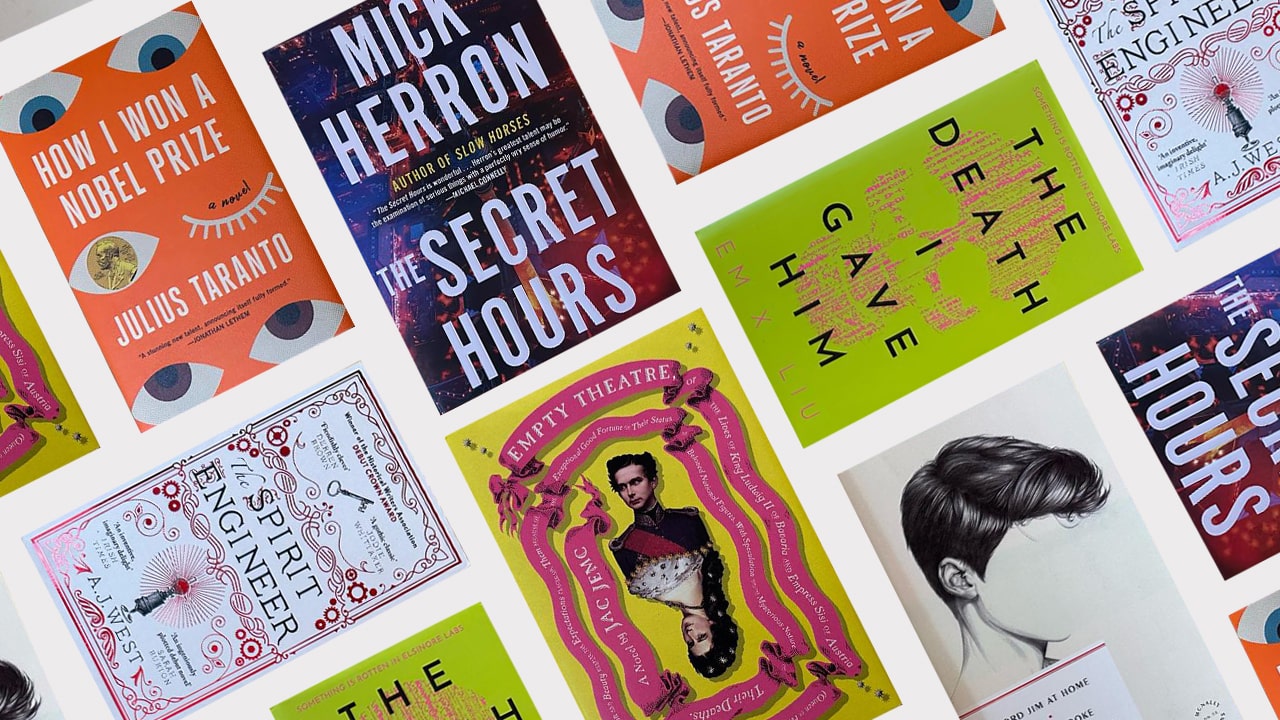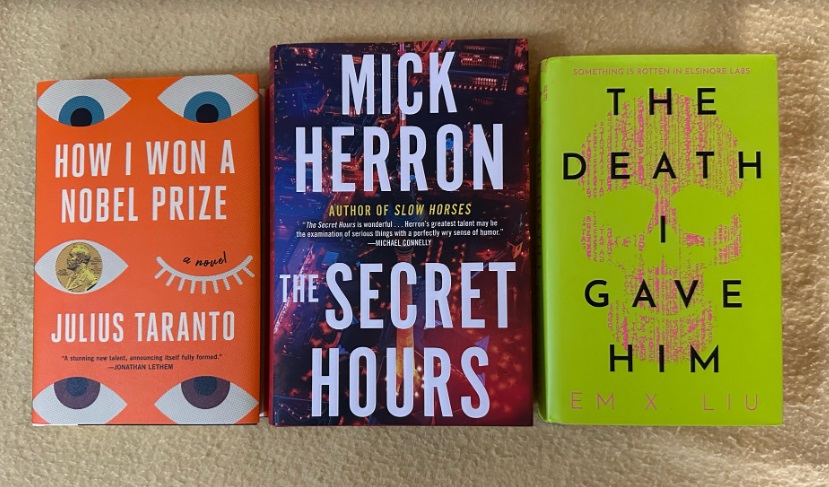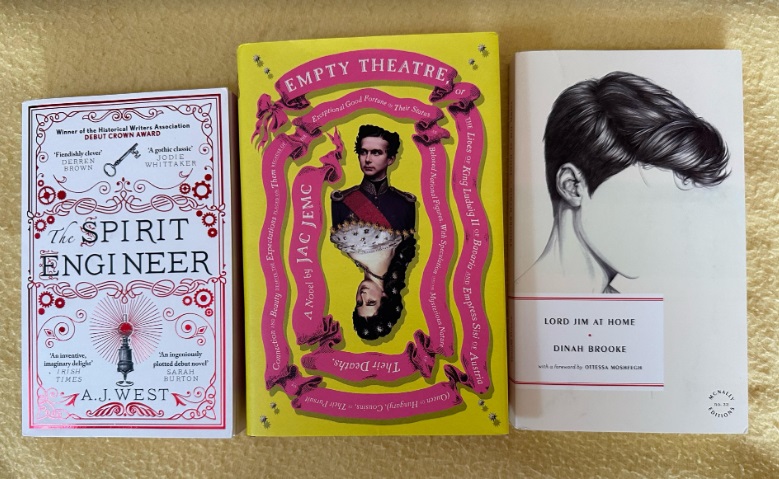IYCRMM: Sly humor in the academe, a 'slow' mystery, sci-fi drama, and the wealth of historical periods
Book reviews on "How I Won A Nobel Prize," "The Secret Hours," "Headed," "The Death I Gave Him," "The Spirit Engineer," "Lord Jim at Home," and "Empty Theatre."

For this month, our six novels make up a mixed bag of literary delights. One qualifies as a university novel, one comes from one of the acknowledged contemporary masters of the spy thriller genre, and there’s an ambitious blend of Shakespeare and sci-fi. Then, three novels address specific historical periods, featuring larger-than-life individuals.
How I Won A Nobel Prize by Julius Taranto
Here’s a delightfully pitched satire set in the world of academia, posing succinct questions about cancel culture, being 'woke,' ethics, and the compromises we make while playing the 'justification game.' Physicist Helen is on track to author brilliant papers about superconductivity. To reach this point, she’s been mentored by Dr. Perry Smoot, a Nobel laureate at Cornell. Due to a sex scandal with another research assistant, Smoot has been canceled and receives an invite to join the Rubin Institute. Funded by a provocative billionaire, Rubin is known for bringing together the deplorable and canceled, offering a new lease on their careers. Helen, in a long-term relationship with Hew, decides to follow Smoot to Rubin, raising questions about whether he has any say in the matter.
Situated on an island with other brilliant but disgraced academics, the Rubin Institute is a controversial academic entity. On campus, Helen is drawn to an older novelist who used to be idolized by her father. Themes such as compromising in the name of progress, defining what it means to be a good person, and the pursuit of the Nobel Prize are explored in this novel. A late plot twist, akin to the novel's version of a deus ex machina, provides a seemingly too clean resolution, making the conclusion appear somewhat far-fetched. However, acknowledging that reality can often be stranger and more improbable than fiction allows readers to embrace this plot device and still enjoy the novel. The novel's perspective on geniuses and whether we should make allowances for their foibles resonates.

The Secret Hours by Mick Herron
Here is Herron’s latest, a standalone story that serves as a chapter in the secret history of MI5, the British Secret Service. Herron is best known for his Slough House series that began with 'Slow Horses,' and those familiar with the novels or series are aware of his expertise in infusing deadpan humor and witty asides into his dissection of the intelligence services—his modern take on the spy novel. In this latest work, deeply rooted in current affairs, readers are given a front-row seat to the Monochrome Inquiry, set in motion by the previous Prime Minister as revenge on Regent Park’s MI5. Tasked with investigating the historical over-reaching and malpractice of the Secret Service, the civil servants chairing the inquiry are Griselda Fleet and Malcolm Kyle.
Headed by First Desk
MI5 naturally resents the incursion and thwarts the inquiry in any feasible manner while dissembling to appear cooperative. The novel functions as a Slough House backstory, delving into a classified 1994 operation in Berlin that resulted in tragedy and scandal. Two major narrative strands unfold: the aforementioned 1994 fiasco in Berlin and the contemporary events surrounding the inquiry, intertwined with a loose agent who is suddenly hunted down by a private entity. The novel's charm lies in how these threads come together, unraveling the implications for the world of Slough House. You'll appreciate how Herron skillfully keeps most of his cards close to his chest until the final chapters, confirming our wild guesses only then. If you're a newcomer to the Herron party, this serves as an excellent introduction.
The Death I Gave Him by Em X. Liu
This is SciFi with a touch of Shakespeare, as the author likens their take to a futuristic retelling of Hamlet. Elsinore Labs is the setting, where Dr. Graham Lichfield and his son Hayden have been working on their Sisyphus Formula that defies death and extends life. At Elsinore, the two collaborate closely with Horatio, the in-facility AI. When Hayden discovers his father's corpse, the lab goes on lockdown. Uncle Charles, head of security Paul Xia, his daughter Felicia (an intern and former girlfriend of Hayden), and Research Assistant Gabriel Rasmussen are the sole individuals in the lab at the time. For Hayden, it's time to solve the murder of his father, to avenge him, but the challenge lies in discovering who killed him.
The complexity of the relationships between Felicia and Hayden, Hayden and his uncle, and Hayden with the in-house AI drives the narrative, leading to unexpected places. Throughout, Liu pushes the envelope in terms of tragedy and psychodrama. As a self-confessed lover of Shakespeare and sci-fi, it's easy to see what drew Liu to write this novel and how cleverly the two obsessions are combined. The hard SciFi aspect is elevated through the Elsinore laboratory and the cutting-edge bio-chemical and medical research taking place. Additionally, there's constant introspection by Hayden and Felicia that mirrors the soliloquies of the Danish play and pays homage to some of its plot developments.

The Spirit Engineer by A. J. West
Belfast, 1914, just two years after the sinking of the Titanic. In the midst of high society's preoccupation with spiritualism, the paranormal, and the popularity of seances, William Jackson Crawford stands as an established man of science, teaching at the university. He is an avowed skeptic in the world of the supernatural and spirits from the afterlife. However, it becomes challenging to deny the allure of this realm when Crawford's own wife converts an unoccupied room in their home into a shrine for her Titanic-victim brother. Enter Kathleen Goligher, one of the women society turns to, claiming the gift to communicate with spirits from the other side. Is she a fraud, a charlatan, preying on the emotional needs of those who seek her out?
Crawford, himself something of an unreliable narrator, narrates this period piece that earned West the HWA Debut Gold Crown Award in 2022 (HWA standing for the Historical Writers Association). The fact that these are true-to-life figures raises the stakes as we turn the pages of this novel, discovering a depth and a gift for intention that goes beyond a mere recounting of facts. The novel explores themes with contemporary applications, including the struggle for power, the destructive nature of paranoia, and how the pursuit of truth can be a two-sided coin. On one side, there's the quest for knowledge, experimentation, and verification; on the other, there's the drive to monetize, where foregone conclusions and satisfying those conclusions can take precedence over the truth.
Empty Theatre by Jac Jemc
In what can only be described as a tragicomic satire, Jemc takes all the source material and references she has amassed about two notorious and controversial 19th-century historical figures and has crafted an impressionistic novel that astounds and entertains. Cousins King Ludwig II of Bavaria and Empress Elisabeth of Austria (Queen of Hungary) are the subjects of this narrative, composed of stirring (imagined or otherwise) episodes and vignettes. Their parallel lives and complex friendship are put under the literary microscope, and with rich imagination, Jemc conjures up their lives with an intimacy and detail that can be credited to her. Sisi’s fate as Empress is the plight of the child bride, seen as nothing more than an heir-bearing receptacle. Then there’s Ludwig and his pursuit of ‘unmanly things’.
What we get is a satire that is both compassionate and sympathetic, yet manages to show the folly, eccentricities, and weaknesses in the characters of these two royal figures. The late 19th century comes to vivid life in the hands of Jemc, seen through the prism of privileged life. Both Ludwig and Sisi died young, leaving behind portraits and palaces, held up as lives that exemplified the absurdities of royalty and pomp. Quite often, hereditary responsibilities are thrust upon individuals unfit for the task. Both Sisi and Ludwig are vain, both rebelled in vain against the roles forced upon them. That they serve as tragic, entertaining, and cautionary tales speaks volumes about Jemc's writing prowess and her choices in presenting the lives of the two — it's as if we're being treated to a Hola compilation of Ludwig and Sisi, despite it being before the time of such publications.
Lord Jim at Home by Dinah Brooke
First published in 1973, this Brooke novel was initially dismissed as a monstrous parody, outright nasty, and a malicious portrayal of upper-middle-class life in England, specifically during the period between the World Wars. Now, 50 years later, the novel finally sees a reprint and is being published in the USA for the first time. With a foreword from Ottessa Moshfegh, a reappraisal is underway, and the verdict is that this is a minor masterpiece that was far too hastily condemned for being painfully truthful. In fact, it is now described as the novel brave enough to record all that nice people in proper society know but refuse to talk about. It is simultaneously a disturbing dramatic vehicle that drives home how childhood vulnerability is exploited and adult cruelty is quite common.
Giles Trenchard leads a life of privilege and hidden violence. His grandfather, a retired judge for the local community, still rules his family with an iron fist, bullying his children and seeming to take great pleasure in doing so. In the early chapters, Giles, as a baby, is referred to as 'The Prince,' his mother as 'The Lady,' and his bullied father as 'The King.' This is all served with delicious irony, as they are anything but these titles. Fast-forwarding to Giles's life in the Navy, despite his background, he fails to rise above a seaman. Hopeless in following the family tradition of the law, Giles vacillates between sponging off his mother, begging from his father, and outright stealing from them. When his desperation leads to a violent crime, we are treated to a court scene that questions the 'whys' of the crime. It's easy to appreciate how such an ugly reflection of themselves would repulse critics and the educated, despite the truth found within the covers.